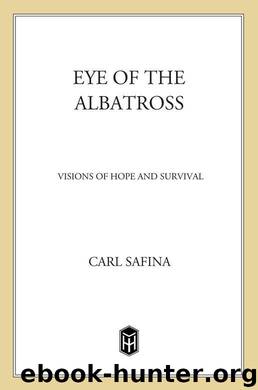Eye of the Albatross: Visions of Hope and Survival by Carl Safina

Author:Carl Safina [Safina, Carl]
Language: eng
Format: azw3
Publisher: Henry Holt and Co.
Published: 2003-04-01T04:00:00+00:00
BAD WEATHER HAD US STUCK in the harbor for a couple of days, and Mark and his crew are savoring the luxury. Just a few years ago, all the boats competed directly for a very limited catch in a very short season, and everyone was forced to fish regardless of the weather. But now, in the wheelhouse of the Masonic, Captain Lundsten is discoursing on the works of Emily Dickinson and Sylvia Plath. Apparently, two decades as a survivor in some of the harshest fishing conditions on Earth have enhanced Mark’s ear for poetry.
Last week he was several thousand miles from here, in Massachusetts, shopping for poetry books at the Harvard Coop. He’d been brought to Boston to advise a National Research Council panel evaluating different forms of fisheries management. Mark says, “People from New England can’t seem to understand why we have fish left in Alaska. We tell them: ‘We just stick to the quota and we leave some for next year.’ They act like they can’t relate. And look at the disaster they have.”
Mark sees his fishery for Sablefish (also called Black Cod) and Pacific Halibut improving. Meanwhile, Atlantic Cod and Atlantic Halibut are spectacular casualties in the demolition derby that has been New England fishing. Populations of both species, depleted from decades of over fishing, remain on the ropes over most of their Atlantic range, at or near all-time lows off New England, the Canadian Maritimes, and across northern Europe. The human toll is depressed communities, thousands of people in once-proud fishing families who lost the livelihoods that were their means of understanding who they were, and large areas closed to fishing, with only hopes the fish will recover someday.
Mark is a leading proponent of a rather new approach to fishery management called Individual Transferable Quotas, ITQs for short. Some fisheries are still unmanaged, open to all comers and limited only by what a boat can catch. The results are typically disastrous: depletion of fish, dislocation of fishers. More and more, fisheries are managed in some way. In a typically managed commercial fishery, a total catch quota is established as a limit. When the boats collectively reach the quota, the fishery is closed for the season, for all participants. This causes each boat to try to catch as many fish as possible before the overall quota is reached and the fishing stopped. The intense competition this race creates is called a “derby.” Because all the boats are competing directly, fishing-industry lobbyists exert political pressure to leave the season open longer or increase the quota, resulting in overfishing and depletion.
New England and the Canadian Maritimes (and a lot of other places) largely destroyed their fisheries through simple greed. As more and more people got in, political pressures prevented fishery managers from accepting the fact that scientists kept flagging: the amount of fish was finite. More and more boats caught more and more fish—until they all started catching fewer and fewer. And finally boats and fishing businesses themselves went belly-up.
Download
This site does not store any files on its server. We only index and link to content provided by other sites. Please contact the content providers to delete copyright contents if any and email us, we'll remove relevant links or contents immediately.
The Lonely City by Olivia Laing(4798)
Animal Frequency by Melissa Alvarez(4461)
All Creatures Great and Small by James Herriot(4311)
Walking by Henry David Thoreau(3953)
Exit West by Mohsin Hamid(3823)
Origin Story: A Big History of Everything by David Christian(3687)
COSMOS by Carl Sagan(3617)
How to Read Water: Clues and Patterns from Puddles to the Sea (Natural Navigation) by Tristan Gooley(3461)
Hedgerow by John Wright(3354)
How to Read Nature by Tristan Gooley(3335)
The Inner Life of Animals by Peter Wohlleben(3310)
How to Do Nothing by Jenny Odell(3293)
Project Animal Farm: An Accidental Journey into the Secret World of Farming and the Truth About Our Food by Sonia Faruqi(3212)
Origin Story by David Christian(3194)
Water by Ian Miller(3177)
A Forest Journey by John Perlin(3068)
The Plant Messiah by Carlos Magdalena(2927)
A Wilder Time by William E. Glassley(2858)
Forests: A Very Short Introduction by Jaboury Ghazoul(2836)
